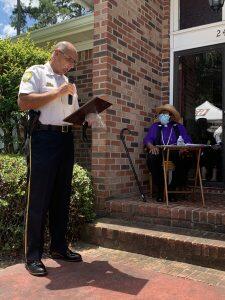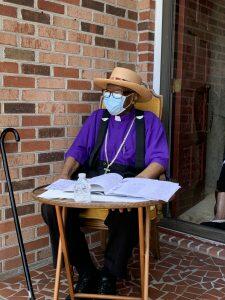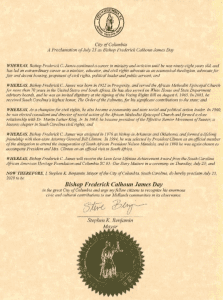Here is a new release from Columbia SC 63, a civil rights history preservation group about the lifetime achievement of civil rights advocate, theologian, educator and Columbia SC native, Bishop Frederick C. James.
Today, Columbia Police Chief W. H. “Skip” Holbrook presented Bishop James with a proclamation from Mayor Steve Benjamin to acknowledge July 23, 2020 as ‘Bishop Frederick Calhoun James Day.’

Chief Holbrook reads aloud the City of Columbia’s proclamation of July 23 as Bishop Frederick Calhoun James Day
Contact: Jonathon Johnson, [email protected]
COLUMBIA—South Carolina’s senior civil rights advocate Bishop Frederick C. James will receive the Leon Love Lifetime Achievement Award from the South Carolina African American Heritage Foundation and Columbia SC 63: Our Story Matters in an outdoor ceremony today.
Engaged with ministry and activism at ninety-eight years old, Bishop James has led an extraordinary career as a minister, educator, and civil rights advocate as an ecumenical theologian, advocate for fair and decent housing, proponent of civil rights, political leader and public servant.
Born in 1922 in Prosperity, South Carolina, Bishop James has served the African Methodist Episcopal Church for more than 70 years in the United States and South Africa. He has also served on White House and State Department advisory boards, and he was an invited dignitary at the signing of the Voting Rights Bill on August 6, 1965. In 2003, he received South Carolina’s highest honor, The Order of the Palmetto, for his significant contributions to the state.
In 1943, Bishop James earned his bachelor’s degree in history and English from Allen University and his master’s of divinity degree from the Howard University School of Religion in 1947. He returned to South Carolina in 1947 to become pastor of Wayman African Methodist Episcopal Church, Winnsboro, then Chappelle Memorial African Methodist Episcopal Church, Columbia, and then Mt. Pisgah African Methodist Episcopal Church in Sumter, a position that he held for 19 years. He was also a professor at Allen University in Columbia, and, later, Dean of Allen University’s Dickerson School of Theology.
As a champion for civil rights, he also became a community and state social and political action leader. In 1960, he was elected consultant and director of social action of the African Methodist Episcopal Church. In this position, he formed a close relationship with Dr. Martin Luther King, Jr. In 1963, he became president of the Effective Sumter Movement of Sumter, a historic chapter in South Carolina civil rights. In 1967, as pastor of Mt. Pisgah A.M.E. Church, the Rev. James led the sponsorship of the first federal housing project in South Carolina, and, in 1969, he initiated the first federal home ownership project in the state.
He was South Carolina’s first African American member of the Department of Social Services and the Department of Alcohol and Drug Abuse. From 1987 to 1992, he was a member of the Columbia Housing Authority and served as vice chair. He also served as vice president of the South Carolina Christian Action Council.
In 1972, this eminent theologian and champion of civil rights was elected to the AME Bishopric and was assigned Presiding Bishop of the AME Church in South Africa, Lesotho, Botswana, Swaziland, Namibia, and Mozambique. Headquartered in Cape Town, South Africa, he established schools, a publishing house, churches, and other institutions.
Bishop James was assigned in 1976 as bishop in Arkansas and Oklahoma. He formed a lifelong friendship with then-state Attorney General Bill Clinton. In 1984, he was assigned to the Seventh Episcopal District, State of South Carolina. In each of these positions, he built housing projects, strengthened schools and led two colleges to full accreditation: Shorter College, North Little Rock, Arkansas in 1981 and Allen University in 1992. In 1992, Bishop James was assigned Ecumenical Bishop and Chaplaincy Endorsement Officer of the African Methodist Episcopal Church International.
In 1993, he was given major fiscal and reconciliation duties as Bishop of the Second Episcopal District (Maryland, Washington, D.C., Virginia, and North Carolina) of the African Methodist Episcopal Church, and he stabilized the District. In 1994, he was selected by President Clinton as an official member of the delegation to attend the inauguration of South African President Nelson Mandela, and in 1998 he was again chosen to accompany President and Mrs. Clinton on an official visit to South Africa. He also served on the White House Advisory Board on Historical Black Colleges and Universities, the U.S. State Department’s Advisory Board on Religious Freedom, and as national vice president of the Interfaith Alliance. He and his wife, Theressa, had retired from active duty in 1996 and returned to live at home in Columbia.
A life member of the NAACP, Alpha Phi Alpha Fraternity, and a thirty-third degree Mason, he was inducted into the South Carolina Black Hall of Fame (1991) and the Columbia Housing Authority Wall of Fame (1994).
The lifetime achievement award is part of the Heritage Foundation’s annual ”Preserving Our Places in History” program. Leon A. Love Sr. (1950–2016) was the chairman of the South Carolina African American Heritage Commission, where he championed the importance of identifying, recording, and preserving the African American experience in our state.
Founded in 1993, the South Carolina African American Heritage Commission works to identify and promote the preservation of historic sites, structures, buildings, and culture of the African American experience in South Carolina.
Established to commemorate the height of the Civil Rights Movement, Columbia SC 63: Our Story Matters continues to gather, preserve and showcase images, artifacts, and individual testimonies to ensure that the deeper, multifaceted story of the struggle for freedom and justice in our city is told.
For more information about the Columbia SC 63 Project, visit: https://columbiasc63.com/about/


